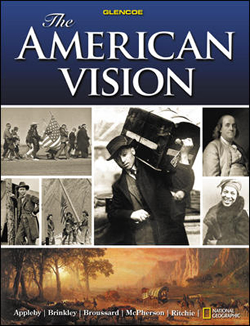The American Vision © 2008Chapter 27:
The Politics of ProtestWeb Lesson PlansIntroduction
Students have read about how César Chávez organized the United
Farm Workers of America (UFW) and helped to improve working conditions for Hispanic
Americans. In this activity students will explore the motivations of Chávez
and the methods he used to gain rights for farm workers.
Lesson Description
Students will use information from the United Farm Workers of America (UFW)
Web site to learn about César Chávez and his efforts to improve
the working conditions of farm workers. Students will read a biography about
Chávez, read about the rise of the UFW, and read about current projects
of the UFW. They can also hear audio clips of popular Chávez speeches.
Students will then answer four questions and apply this information by designing
a pamphlet that describes the history of the UFW.
Instructional Objectives- Students will explain how Chávez's actions expanded economic opportunities
and political rights for Hispanic Americans.
- Students will be able to use this knowledge to create a pamphlet that describes
the history of the UFW.
Student Web Activity Answers- Chávez was born to a Spanish-speaking migrant farm family. Growing
up, he attended English-speaking schools. Since he spoke only Spanish at home,
school was difficult for him. In addition, he attended segregated schools
where he felt ostracized. His family worked in the fields of California, and
poverty and change marked his childhood.
- In 1965 farm workers' wages kept them in poverty. Growers routinely ignored
state laws regarding working standards. Most lived in shack-like quarters
with no heating, plumbing, or cooking facilities. In the fields, there were
no portable toilets, and injuries on the job were frequent. Child labor was
rampant. The average field worker lived only 49 years—a testament to
the hardships they endured.
- The union used strikes, boycotts, and marches to pressure growers into signing
union contracts that improved conditions for workers. Chávez used highly
publicized fasts to bring attention to the farm workers' conditions. The union
currently supports continued boycotts of non-union labeled produce, informs
consumers of union labeled products, asks citizens to write legislators, and
encourages farm workers to register to vote.
- Over the years farm workers have gained health coverage, credit unions,
community centers, and higher wages. The improvement to their standard of
living has given Hispanic Americans an economic voice. The strength of unity
gave the farm workers a better bargaining position when negotiating with growers.
Their protests gave them
courage to speak out politically and made their plight visible to the nation.
The union encourages its members to write to legislators, and this gives them
a political voice.
- Students' pamphlets will vary.
 | 




